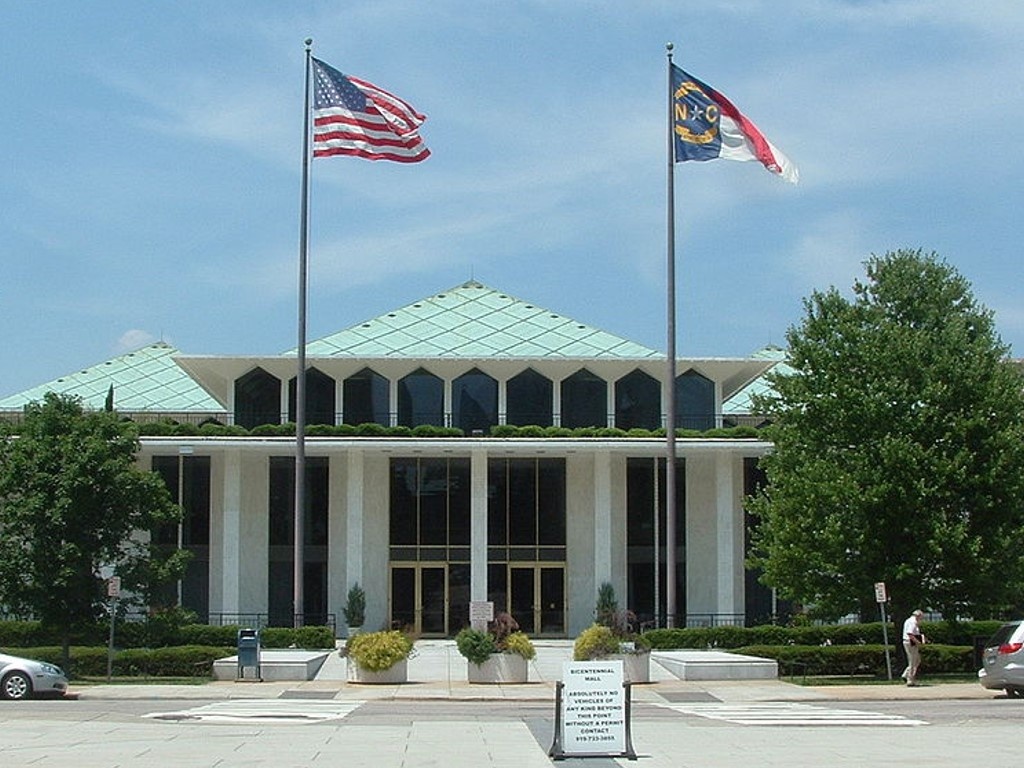Growing Southern cities are increasingly targets of state pre-emption

The North Carolina legislature has been overturning local policies through pre-emption laws, which have become increasingly widespread throughout the South in recent years. (Photo by Jayron32 via Wikimedia.)
On March 23, North Carolina lawmakers approved a controversial new law rolling back local LGBT protections and sparking outrage across the state and country.
HB2, which passed a special session of the legislature in nine hours and was signed into law by Gov. Pat McCrory (R) that same day, was a direct response to a Charlotte ordinance that allowed transgender people to use public bathrooms in accordance with their gender identity and extended nondiscrimination protections to LGBT individuals.
Nullifying the Charlotte ordinance, the state law now requires people to use public bathrooms that match their biological sex as stated on their birth certificate. It then goes further, making the state's nondiscrimination policy, which doesn't include sexual orientation or gender identity, and state labor laws, including minimum wage regulations, "supersede and preempt" local policies.
North Carolina lawmakers' effort to overturn a local ordinance is the latest in a series of political showdowns across the South between cities, which are often progressive and led by Democrats, and states, where conservatives dominate.
With progressive policy gaining little traction at the state level, the region's cities have become laboratories for advancing progressive policies, from protections for LGBT people to minimum wage hikes, fracking bans and policies to promote immigrant integration.
State lawmakers have taken aim at cities through state-level "pre-emption laws" that nullify local policies. In many instances, they have gotten help from the American Legislative Exchange Council, a corporate-backed advocacy group that provides model legislation.
For example, ALEC crafted a model bill, versions of which were passed in North Carolina and elsewhere, that pre-empted local ordinances designed to foster greater trust between local police and immigrants.
This city-state conflict has intensified as Southern cities have boomed. Of the 20 fastest growing metro areas in the country between 2010 and 2015, all but six were in the South, according to a Facing South analysis of recent Census estimates.
In North Carolina, dramatic growth in Charlotte and the capital city of Raleigh has propelled the state over the 10 million person milestone in 2015, making it the ninth-most populous state in the country.
Amid this urban growth, state lawmakers have gotten increasingly involved in local affairs — not only invalidating local anti-discrimination ordinances but attempting to re-draw electoral districts in Wake County, home to Raleigh; take control of Charlotte's airport; and overturn a minimum wage increase in Greensboro, the state's third-largest city.
Most of North Carolina's pre-emption efforts have been challenged in court, and several have been overturned.
Texas is also home to some of the South's fastest-growing cities, with the four metro areas around Houston, Dallas, Austin and San Antonio making up over 80 percent of the state's overall growth between 2010 and 2015. Those cities have also sparred with state lawmakers in recent years over nondiscrimination ordinances and so-called "sanctuary city" policies, most recently in Dallas.
Florida cities have experienced significant growth as well, with the Miami-Fort Lauderdale-West Palm Beach area growing by over 450,000 people between 2010 and 2015. During this time, state lawmakers have targeted policies in Miami-Dade and neighboring Broward counties, imposing a 2013 statewide ban on local living wage ordinances and attempting to ban "sanctuary city" policies, an effort that was ultimately defeated.
The rapid growth of cities is also having an impact in less populous states like Arkansas, where state officials are battling Fayetteville over local protections for the LGBT community. The city is the second-largest metro area in Arkansas, and its population has grown by over 60 percent between 2000 and 2014.
Voters there approved a referendum last year expanding nondiscrimination protections to LGBT people, but the Arkansas attorney general has challenged the move in state court for violating Act 137, a law passed last year to pre-empt local authority to expand nondiscrimination protections. A lower court ruled in favor of Fayetteville but the case is getting appealed to the state Supreme Court.
Mark Pertschuk, head of the watchdog group Preemption Watch, said that 2015 saw more efforts to undermine local control on more issues than any year in history, with at least 29 states considering pre-emption bills affecting local policies — and his group expects to see even more this year.
Tags
Allie Yee
Allie is a research fellow at the Institute for Southern Studies and is currently studying at the Yale School of Management. Her research focuses on demographic change, immigration, voting and civic engagement.
